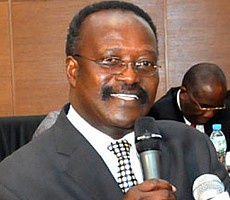
Mr Kwesi Ahwoi, out-going Minister of the Interior, has called on Ghanaians to embrace on-going debates and discussions on alternative policies on the sale and use of illicit drugs. According to him there is no reason why Ghanaians should not question whether drug laws and policies in the past and present have done more harm than good in Ghana and in other countries in West Africa.
He said: “We in Ghana do not and should not object to any discussion on alternative policies. What is crucial is that once we agree to discuss alternatives or the pros and cons of the present policy, we must also agree to discuss all possible alternatives, the cost and benefits of each such alternative in socio-economic, cultural, health and political terms.
Mr Ahwoi made the call at the opening of the West Africa Executive course on “Human Rights and Drug Policy”. The 10-day course which is being organised by the Open Society Foundation, an NGO in collaboration with the Faculty of Law of the University of Ghana, brought together participants from West African countries including Ghana, Nigeria, Mali, Cameroon, Sierra Leone and Liberia.
The participants who have diverse backgrounds in police, military, law and pharmacology among others, would be offered the platform to reinforce the debate on evolving relationship between Ghana’s drug policy and human rights and dilate on the perspectives of the Government of Ghana and the interventions being made to manage the drug menace in the country.
He said the global fight against narcotics had not yielded much because human rights which are relevant had unfortunately not been given much attention in all the United Nation treaties. “People addicted to drugs are generally thought to be morally flawed and lacking in will power. These views have shaped our responses to drug abuse, treating it as a moral failing rather than a health problem and thus have led to an emphasis on punitive rather than preventive and therapeutic responses,” he said.
Mr Ahwoi noted that even now discussions of drug abuse is often relegated to the mythical shadows, steeped in stigma and misunderstanding. However, significant advances in neuroscience have began to change societal responses to drug abuse, enabling the society to respond more effectively to the problem and the drug policy therefore is shifting from incarceration to prevention and access to treatment.
The Minister said mainstreaming human rights in international drug control must necessarily include ensuring that human rights impact assessment be used as an evaluative and developmental policy tool, incorporating human rights compliance assessment into the country’s annual National Drug Report and making a deliberate policy to train staff and officers on human rights.
He said countries, including The Netherlands, had tried approaching the drug abuse issue from the perspective of public health and given reliefs such as clean needles and education to illicit drug users as a harm reduction strategy to the problem. Mr Ahwoi advocated that prevention, treatment and harm prevention must be integrated rather than treated as mutually exclusive in the national drug policy.
Mr Ahwoi said: “We in Ghana see nothing wrong with this debate” and what is even more important for this interrogation is the fact that with high profile arrests, international drug control is increasingly occupying space in the mainstream of politics and media. He said drug abuse and trafficking are menaces which pose a global challenge with an equal negative effect on all humanity; therefore it is no respecter of persons.
In Ghana there is a rising incidence of illicit drug abuse and drug trafficking locally and in the West African sub-region. According to him all the policies and measures that have been introduced in the past and are still in place to curb the use and trade of illicit drugs have often violated the human rights of drug addicts and encourage strong stigmatisation of this group of persons in the society.
He acknowledged the work of the Narcotics Control Board (NACOB) as the lead agency in Ghana in the fight against illicit drug abuse and trafficking through a supply reduction approach by way of enforcement of laws and demand reduction approach through education, counselling, treatment, rehabilitation, social re-integration and other long-term alternative development programmes.
Ghana’s Narcotic Commission Bill (NCB) is pending at the Attorney General’s Department prior to submission to Cabinet and Parliament and it is hoped that the Bill will demonstrate a commitment to a smarter, more human approach to the drug issue. He expressed the hope that the outcome of the course would provide input into the NCB.
Mr Yaw Akrasi Sarpong, Executive Secretary of (NACOB), agreed on the need to tackle the supply of illicit drugs and also pay more attention to health in order to lower the demand. He, however, indicated that solutions and interventions adopted must however be based on scientific knowledge.